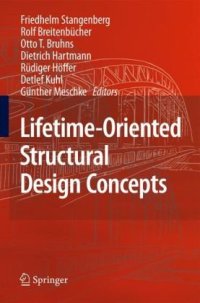
Ebook: Lifetime-Oriented Structural Design Concepts
- Tags: Building Materials, Building Repair and Maintenance, Materials Science general, Structural Mechanics, Building Construction HVAC Refrigeration
- Year: 2009
- Publisher: Springer-Verlag Berlin Heidelberg
- Edition: 1
- Language: English
- pdf
Safety and reliability are important for the whole expected service duration of an engineering structure. Therefore, prognostical solutions for different building types are needed and uncertainties have to be handled. Life-cycle strategies to control future structural degradations by concepts of appropriate design have to be developed, in case including means of inspection, maintenance, and repair. Aspects of costs and sustainability also matter.
The Cooperative Research Center for Lifetime-Oriented Design Concepts (SFB 398) at Ruhr University in Bochum combines the wide range of scientific topics between structural engineering, structural and soil mechanics and material sciences regarding structural lifetime management in this present extraordinary monolithic format.
The characterization and modeling of lifetime-related external actions of multiple origin are presented in this book as well as the physical description, the modeling and the validation of material degradation. Adaptive numerical methods and simulation techniques are provided for the lifetime-oriented design concepts to forecast material and structural degradation. Stochastic aspects, mathematical optimization methods and interactions between various influences are included. Thus, a solid basis is provided for future practical use and also for standardization of structural design with respect to lifetime-prediction.
Safety and reliability are important for the whole expected service duration of an engineering structure. Therefore, prognostical solutions for different building types are needed and uncertainties have to be handled. Life-cycle strategies to control future structural degradations by concepts of appropriate design have to be developed, in case including means of inspection, maintenance, and repair. Aspects of costs and sustainability also matter. The Cooperative Research Center for Lifetime-Oriented Design Concepts (SFB 398) at Ruhr University in Bochum combines the wide range of scientific topics between structural engineering, structural and soil mechanics and material sciences regarding structural lifetime management in this present extraordinary monolithic format. The characterization and modeling of lifetime-related external actions of multiple origin are presented in this book as well as the physical description, the modeling and the validation of material degradation. Adaptive numerical methods and simulation techniques are provided for the lifetime-oriented design concepts to forecast material and structural degradation. Stochastic aspects, mathematical optimization methods and interactions between various influences are included. Thus, a solid basis is provided for future practical use and also for standardization of structural design with respect to lifetime-prediction.